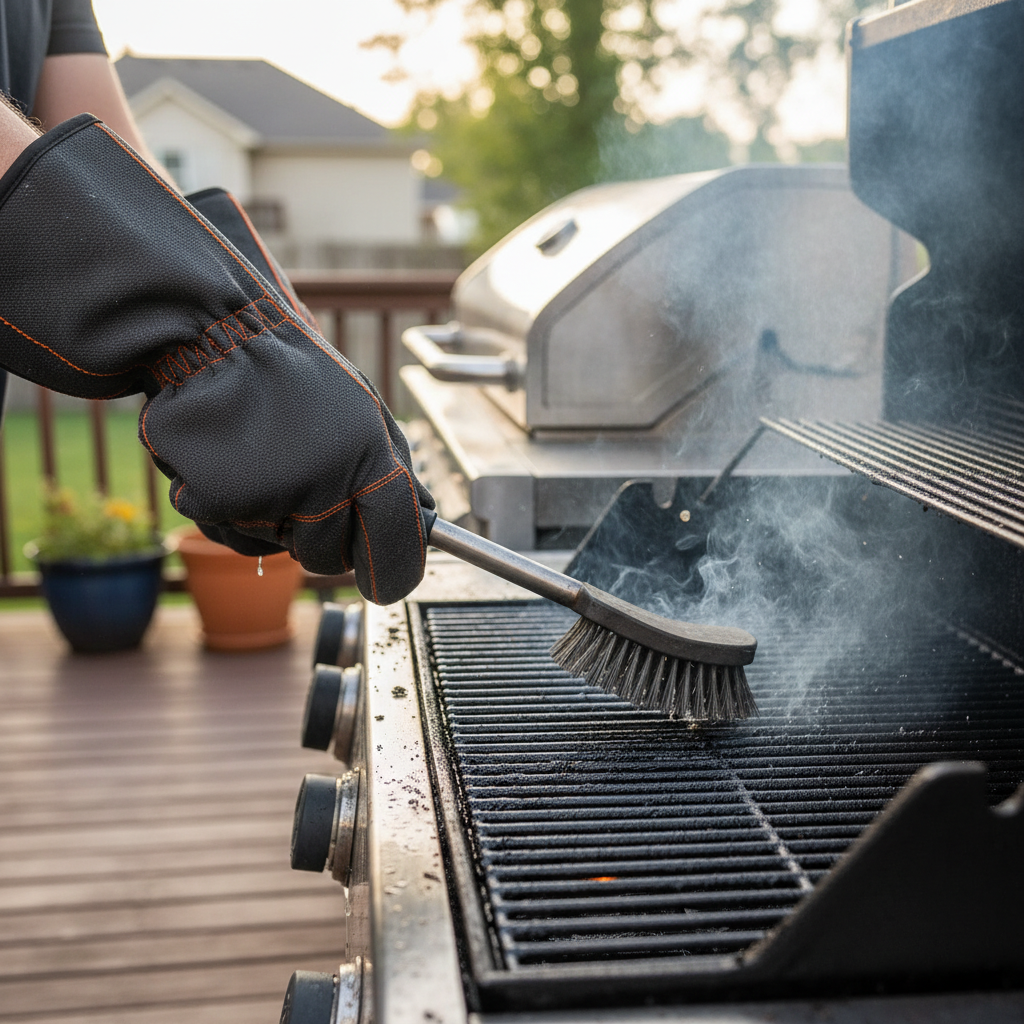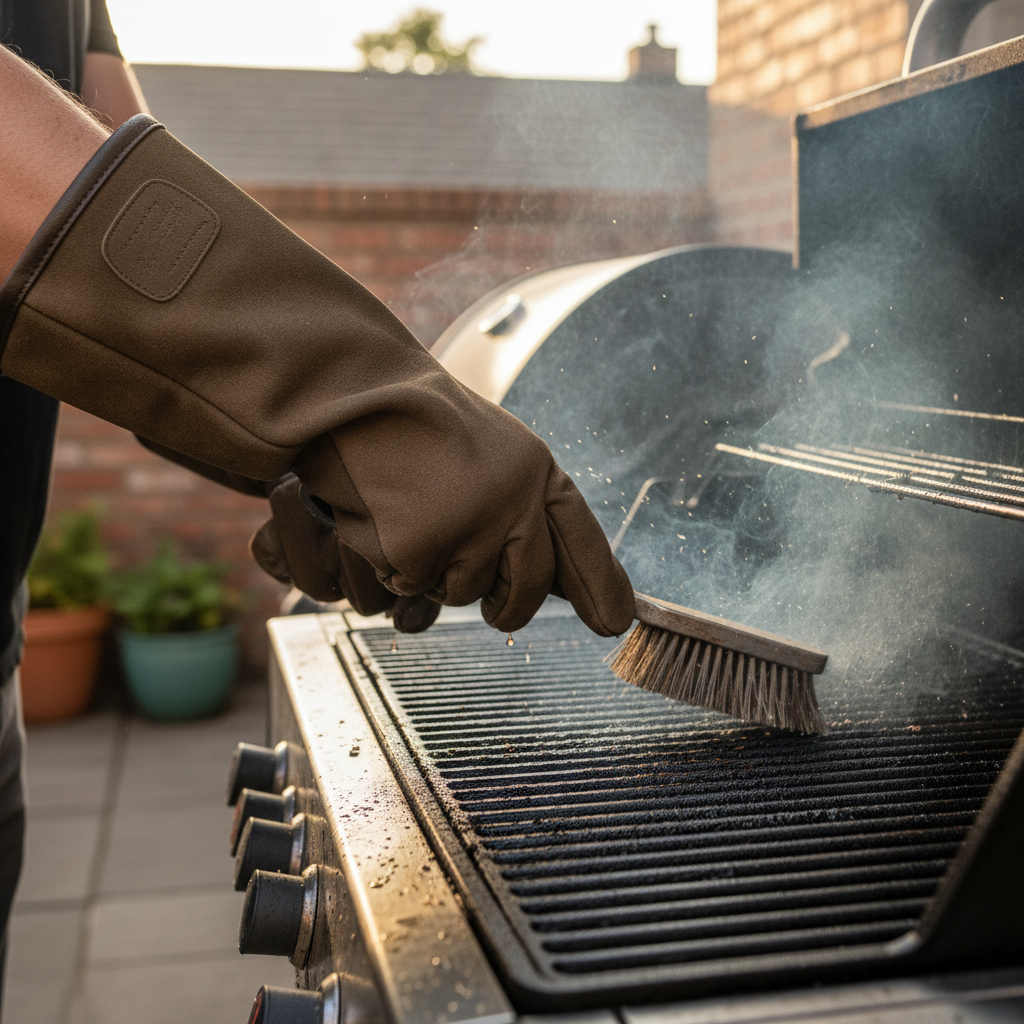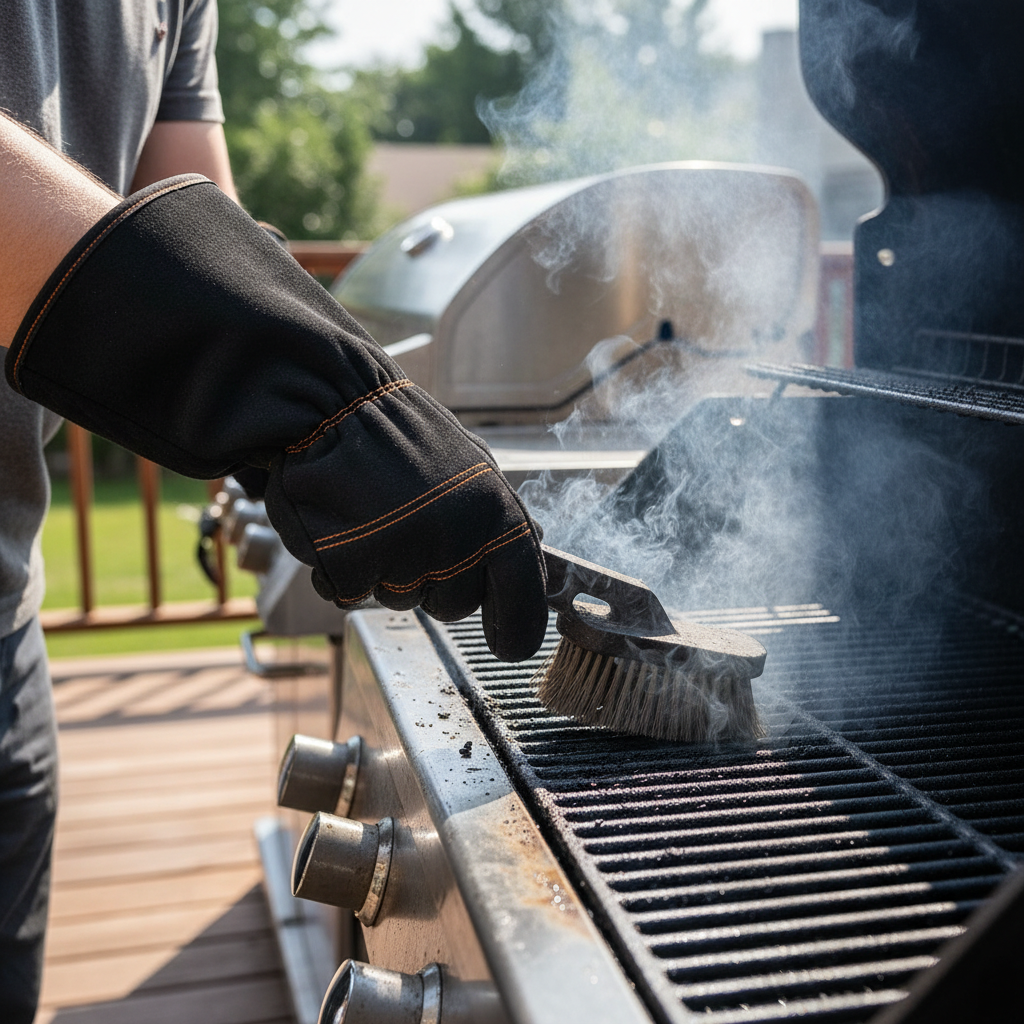
The Best BBQ Cleaning Gloves for Ultimate Protection
Cleaning your BBQ grill can be a messy and sometimes hazardous task. From stubborn grease and charred residue to hot grates and potent cleaning solutions, your hands are constantly exposed to potential harm. That’s why investing in the best BBQ cleaning gloves isn’t just a convenience—it’s an essential part of maintaining your grill safely and effectively. Proper hand protection ensures you can tackle the toughest grime without risking burns, chemical irritation, or cuts.
Why You Need Specialized BBQ Cleaning Gloves

While any old pair of gloves might seem sufficient, dedicated BBQ cleaning gloves are designed with specific challenges in mind. They offer superior protection against:
- Heat: Hot grill grates can cause severe burns, even hours after cooking.
- Chemicals: Harsh degreasers and cleaning agents can irritate or damage skin.
- Grime and Grease: Keeps your hands clean and prevents the transfer of dirt.
- Sharp Edges: Protects against scrapes and cuts from grill grates or cleaning tools.
- Odors: Prevents lingering BBQ smells on your hands.
Having the right gloves allows you to clean more thoroughly, reach into tight spaces, and apply the necessary elbow grease without concern for your hands.
Types of BBQ Cleaning Gloves

Not all cleaning tasks are the same, and neither are all gloves. Understanding the different types available will help you select the perfect pair for your specific needs.
Heat-Resistant Gloves
These are crucial if you plan to clean your grill while it’s still warm or to handle hot components. Made from materials like silicone, aramid fiber (Kevlar/Nomex blends), or thick leather, they offer insulation against high temperatures.
- Silicone Gloves: Often waterproof, easy to clean, and provide excellent grip, even when wet or greasy. They’re great for handling hot food or grates but might not offer the highest dexterity.
- Aramid Fiber Gloves: Typically textile-based, offering very high heat resistance and good dexterity. Some versions have silicone grips for better handling. They are usually not waterproof, making them less ideal for wet chemical cleaning.
A good example of a robust heat-resistant option for grilling and cleaning tasks is the RAPICCA 932°F Heat Resistant BBQ Grill Gloves, which are oil-resistant and waterproof, providing excellent versatility.
Chemical-Resistant Gloves
When using powerful degreasers or oven cleaners, you need gloves that can withstand corrosive chemicals and prevent skin exposure. These are typically made from:
- Nitrile: Excellent resistance to many chemicals, punctures, and tears. Often available in thicker, reusable options for heavy-duty use.
- Heavy-Duty Rubber (Latex/Neoprene blends): Offers strong chemical protection and durability. They are often thick and long, providing good forearm coverage.
These gloves are indispensable when using powerful cleaning agents like Easy‑Off Professional Oven & Grill Cleaner, ensuring your hands stay protected from harsh formulas.
Disposable Nitrile Gloves
For quick cleanups, light tasks, or to wear as a liner under heavier gloves for added protection, disposable nitrile gloves are a great choice. They offer good chemical resistance for their thickness and prevent cross-contamination.
- Pros: Convenient, hygienic, good dexterity, moderate chemical resistance.
- Cons: Not heat-resistant, prone to tearing with heavy-duty scrubbing.
They are perfect for applying seasoning or handling food, but also serve well for light cleanup tasks, such as handling grill wipes or applying mild cleaners. You can find reliable Disposable Nitrile Gloves (food-safe) for these purposes.
Key Features to Consider When Buying
Beyond the material type, several other features contribute to the effectiveness and comfort of your BBQ cleaning gloves.
Material & Durability
Look for materials that are thick enough to provide adequate protection against punctures and abrasions. Reinforced seams and textured surfaces can also indicate a more durable glove.
Length & Coverage
Longer cuffs are highly recommended, especially for chemical cleaning or reaching into deep grills. They protect not just your hands but also your forearms from splashes, heat, and grime.
Grip & Dexterity
A textured palm and fingers are essential for maintaining a secure grip on slippery cleaning tools, wet grates, or greasy surfaces. However, ensure the gloves don’t sacrifice too much dexterity, making it hard to perform intricate cleaning tasks.
Ease of Cleaning
Some gloves, particularly silicone or rubber, are very easy to rinse clean. Fabric-based gloves might require more thorough washing and drying to prevent odors and mildew.
Our Top Picks: Best BBQ Cleaning Gloves for Every Task
Based on the types and features discussed, here are our recommendations for different cleaning scenarios:
For High-Heat Grill Grate Scraping
When you’re dealing with a grill that’s still warm and using a sturdy scraper or brush, you need maximum heat protection combined with good grip. Heavy-duty, long-cuffed silicone or aramid fiber gloves are ideal. Pair them with a robust cleaning tool like the Grill Rescue Brush (bristle-free) for effective cleaning without metal bristles.
For Heavy-Duty Degreasing & Chemical Use
For tackling baked-on grease with strong Grill Cleaner & Degreaser, thick, elbow-length chemical-resistant gloves made from high-quality nitrile or rubber are a must. These will protect your skin from the caustic properties of the cleaners and prevent any splashes from reaching your forearms.
For General Cleanup & Light Tasks
For wiping down surfaces, handling light spills, or applying milder cleaning solutions, disposable nitrile gloves offer convenience and sufficient protection. For more thorough wiping, consider using them with Microfiber Cleaning Towels or specialized BBQ Dual Action Grill Tough Wipes.
Choosing the Right Gloves for Your BBQ Cleaning Needs
Consider the typical state of your grill when you clean it and the types of cleaning agents you use. If you often clean immediately after cooking, heat-resistant gloves are paramount. If you let the grill cool down and use powerful degreasers, chemical-resistant gloves are your priority. Many grill masters find it beneficial to have two pairs: one for heat and one for chemicals, or a versatile pair that offers both.
Maintaining Your BBQ Cleaning Gloves
To ensure your gloves last and remain effective, proper care is important:
- Rinse Immediately: After use, rinse gloves thoroughly to remove all cleaning agents and grime.
- Inspect for Damage: Before each use, check for tears, punctures, or signs of degradation, especially with chemical-resistant gloves.
- Dry Properly: Hang gloves to dry completely, inside out if possible, to prevent mildew and odors.
- Store Appropriately: Keep them in a cool, dry place away from direct sunlight, which can degrade some materials.
Frequently Asked Questions About BBQ Cleaning Gloves
Q1: Can I use regular dishwashing gloves for BBQ cleaning?
A1: While dishwashing gloves offer some chemical protection, they typically lack the heat resistance and heavy-duty durability required for serious BBQ cleaning. They can melt on hot grates and may not withstand the abrasive nature of grill brushes and scrapers, making specialized BBQ cleaning gloves a safer and more effective choice.
Q2: How do I clean my BBQ cleaning gloves after use?
A2: For silicone or rubber gloves, simply rinse them thoroughly with warm water and soap, then hang them to air dry. For fabric-based heat-resistant gloves, consult the manufacturer’s instructions; many can be hand-washed or machine-washed on a gentle cycle, then air-dried.
Q3: Are there gloves that are both heat and chemical resistant?
A3: Yes, some specialized gloves, particularly those made from heavy-duty silicone with extended cuffs, offer a good balance of both heat and chemical resistance. Always check the product specifications for temperature ratings and chemical compatibility to ensure they meet your needs.
Q4: How often should I replace my BBQ cleaning gloves?
A4: Replace your gloves when you notice any signs of wear, such as thinning material, cracks, tears, or loss of grip. For chemical-resistant gloves, degradation due to chemical exposure might not always be visible but can reduce their protective qualities over time. Regular inspection is key.
Q5: What’s the best length for BBQ cleaning gloves?
A5: For comprehensive protection, especially when cleaning deep grills or using harsh chemicals, gloves with extended cuffs (14-18 inches) are generally best. This length protects not only your hands but also your wrists and forearms from heat, splashes, and grime.
BBQCleaner.com is a participant in the Amazon Services LLC Associates Program, an affiliate advertising program designed to provide a means for sites to earn advertising fees by advertising and linking to Amazon.com. We may earn a commission from qualifying purchases made through the links on this page.
